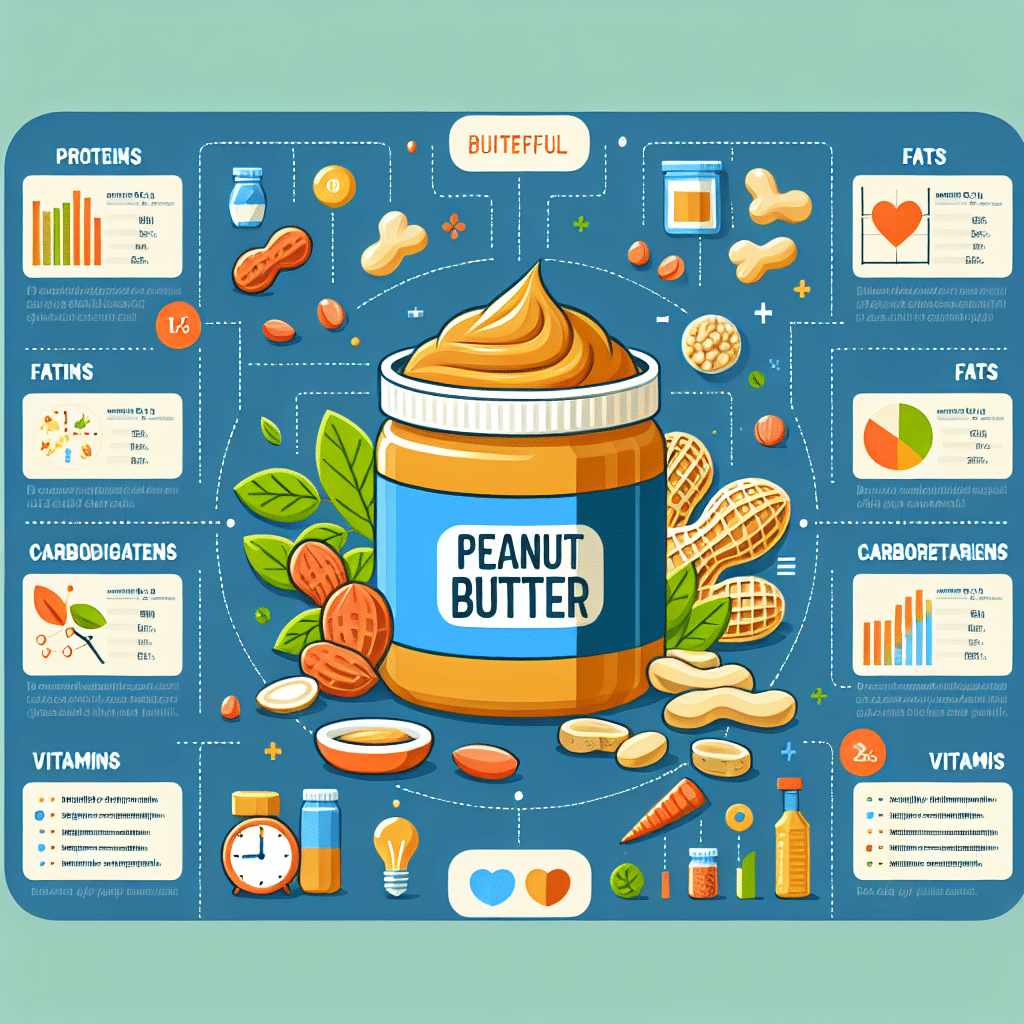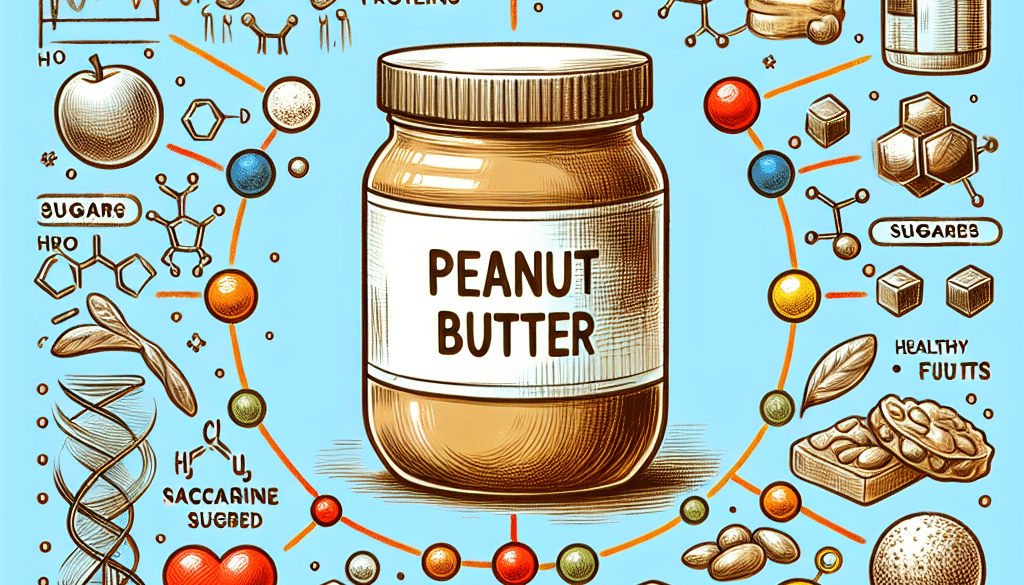Peanut Butter Breakdown: Nutritional Analysis
-
Table of Contents
- Peanut Butter Breakdown: A Comprehensive Nutritional Analysis
- Understanding the Nutritional Profile of Peanut Butter
- Macronutrients in Peanut Butter
- Vitamins and Minerals in Peanut Butter
- Phytochemicals and Antioxidants in Peanut Butter
- Health Benefits of Peanut Butter
- Potential Drawbacks of Peanut Butter
- Choosing the Right Peanut Butter
- Integrating Peanut Butter into Your Diet
- Case Studies and Statistics
- Conclusion: Embracing Peanut Butter’s Nutritional Power
- Discover ETprotein’s High-Quality Protein Products
Peanut Butter Breakdown: A Comprehensive Nutritional Analysis

Peanut butter is a staple in many households around the world, known for its rich flavor and creamy texture. But beyond its taste, peanut butter is also a source of various nutrients that can play a significant role in a balanced diet. In this article, we will delve into the nutritional components of peanut butter, examining its benefits, potential drawbacks, and how it fits into a healthy lifestyle.
Understanding the Nutritional Profile of Peanut Butter
Peanut butter is more than just a delicious spread; it’s a complex food with a rich nutritional profile. Here, we break down the key components that make up peanut butter’s nutritional landscape.
- Macronutrients
- Vitamins and Minerals
- Phytochemicals and Antioxidants
Macronutrients in Peanut Butter
Peanut butter is primarily composed of fats, proteins, and carbohydrates. The specific breakdown of these macronutrients can vary depending on the brand and whether it’s a natural or processed product.
- Fats: The majority of the fat in peanut butter is monounsaturated and polyunsaturated, which are considered heart-healthy fats. These fats can help lower bad cholesterol levels and reduce the risk of heart disease.
- Proteins: Peanut butter is a good source of plant-based protein, making it a popular choice among vegetarians and vegans. Protein is essential for building and repairing tissues in the body.
- Carbohydrates: While peanut butter does contain some carbohydrates, it is relatively low in sugars, with most of the carbs coming from dietary fiber. This can help with digestion and maintaining a feeling of fullness.
Vitamins and Minerals in Peanut Butter
Peanut butter contains a variety of vitamins and minerals that are essential for health. These include:
- Vitamin E
- Magnesium
- Phosphorus
- Zinc
- Niacin
- Vitamin B6
Each of these nutrients plays a role in maintaining bodily functions, from immune response to energy production and bone health.
Phytochemicals and Antioxidants in Peanut Butter
Peanuts contain bioactive compounds such as resveratrol, coumaric acid, and phytosterols that have antioxidant properties. These compounds can help protect the body from oxidative stress and may reduce the risk of chronic diseases.
Health Benefits of Peanut Butter
Regular consumption of peanut butter, in moderation, can offer several health benefits:
- Heart Health: The healthy fats in peanut butter can contribute to a lower risk of cardiovascular disease.
- Weight Management: The protein and fiber in peanut butter can help control appetite and support weight management efforts.
- Muscle Building: As a protein-rich food, peanut butter can support muscle growth and repair, especially when paired with regular exercise.
- Blood Sugar Control: The low glycemic index of peanut butter means it has a minimal impact on blood sugar levels, making it a good option for those with diabetes.
Potential Drawbacks of Peanut Butter
While peanut butter has many positive attributes, there are potential drawbacks to consider:
- Calories: Peanut butter is calorie-dense, so portion control is important to avoid excess calorie intake.
- Added Sugars and Fats: Some processed peanut butters contain added sugars, hydrogenated oils, and other unhealthy ingredients.
- Allergies: Peanut allergies are common and can be severe. Those with peanut allergies must avoid peanut butter.
Choosing the Right Peanut Butter
Not all peanut butters are created equal. When selecting a peanut butter, consider the following:
- Opt for natural or organic varieties with minimal ingredients, ideally just peanuts and salt.
- Avoid products with added sugars, hydrogenated oils, or excessive salt.
- Check the label for serving sizes to manage calorie intake effectively.
Integrating Peanut Butter into Your Diet
Peanut butter can be a versatile addition to your diet. Here are some ideas for incorporating it into meals and snacks:
- Spread on whole-grain toast or fruit slices
- Added to smoothies for a protein boost
- Used in sauces and dressings
- Included in baking recipes as a fat substitute
Case Studies and Statistics
Several studies have highlighted the benefits of including peanut butter in the diet. For instance, research has shown that consuming peanuts and tree nuts may reduce the risk of heart disease. Additionally, a study published in the Journal of the American Medical Association found that consuming peanut butter could lower the risk of developing type 2 diabetes.
Conclusion: Embracing Peanut Butter’s Nutritional Power
Peanut butter is more than just a tasty spread; it’s a nutrient-dense food that can contribute to a healthy diet when consumed in moderation. By understanding its nutritional makeup and being mindful of the type and amount you consume, peanut butter can be a valuable addition to your dietary routine.
Discover ETprotein’s High-Quality Protein Products
If you’re looking to enhance your diet with additional protein sources, consider ETprotein’s range of products. ETprotein is a reputable peanut protein Chinese factory manufacturer and supplier, offering a variety of organic bulk vegan protein and plant proteins. Their products are characterized by a neutral taste, non-GMO, and allergen-free attributes, making them suitable for a wide range of dietary needs.
Whether you’re involved in sports nutrition, weight management, dietary supplements, or simply looking for high-quality protein to add to your diet, ETprotein has you covered. Their extensive product range ensures that you can find the perfect protein solution for your needs.
For more information or to sample their products, please contact ETprotein and email sales(at)ETprotein.com today.
About ETprotein:
ETprotein, a reputable peanut protein Chinese factory manufacturer and supplier, is renowned for producing, stocking, exporting, and delivering the highest quality organic bulk vegan protein and plant proteins. They include Organic rice protein, clear rice protein, pea protein, clear pea protein, pumpkin seed protein, sunflower seed protein, mung bean protein, peanut protein etc. Their offerings, characterized by a neutral taste, non-GMO, allergen-free attributes, cater to a diverse range of industries. They serve nutraceutical, pharmaceutical, cosmeceutical, veterinary, as well as food and beverage finished product distributors, traders, and manufacturers across Europe, USA, Canada, Australia, Thailand, Japan, Korea, Brazil, and Chile, among others.
ETprotein specialization includes exporting and delivering tailor-made protein powder and finished nutritional supplements. Their extensive product range covers sectors like Food and Beverage, Sports Nutrition, Weight Management, Dietary Supplements, Health and Wellness Products, and Infant Formula, ensuring comprehensive solutions to meet all your protein needs.
As a trusted company by leading global food and beverage brands and Fortune 500 companies, ETprotein reinforces China’s reputation in the global arena. For more information or to sample their products, please contact them and email sales(at)ETprotein.com today.












